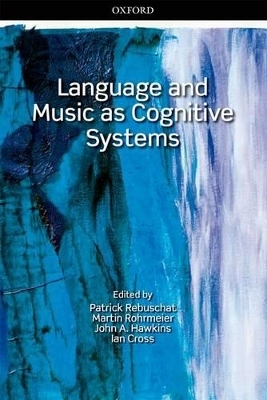
Language and Music as Cognitive Systems
Seiten
2011
Oxford University Press (Verlag)
978-0-19-955342-6 (ISBN)
Oxford University Press (Verlag)
978-0-19-955342-6 (ISBN)
The past 15 years have witnessed an increasing interest in the comparative study of language and music as cognitive systems. This book presents an interdisciplinary study of language and music, exploring the following core areas - structural comparisons, evolution, learning and processing, and neuroscience.
The past 15 years have witnessed an increasing interest in the comparative study of language and music as cognitive systems. Language and music are uniquely human traits, so it is not surprising that this interest spans practically all branches of cognitive science, including psychology, computer science, linguistics, cognitive neuroscience, and education. Underlying the study of language and music is the assumption that the comparison of these two domains can shed light on the structural and functional properties of each, while also serving as a test case for theories of how the mind and, ultimately, the brain work.
This book presents an interdisciplinary study of language and music, bringing together a team of leading specialists across these fields. The volume is structured around four core areas in which the study of music and language has been particularly fruitful: (i) structural comparisons, (ii) evolution, (iii) learning and processing, and (iv) neuroscience. As such it provides a snapshot of the different research strands that have focused on language and music, identifying current trends and methodologies that have been (or could be) applied to the study of both domains, and outlining future research directions. This volume is valuable in promoting the investigation of language and music by fostering interdisciplinary discussion and collaboration.
With an ever increasing interest in both music cognition and language, this book will be valuable for students and researchers of psychology, linguistics, neuroscience, and musicology.
The past 15 years have witnessed an increasing interest in the comparative study of language and music as cognitive systems. Language and music are uniquely human traits, so it is not surprising that this interest spans practically all branches of cognitive science, including psychology, computer science, linguistics, cognitive neuroscience, and education. Underlying the study of language and music is the assumption that the comparison of these two domains can shed light on the structural and functional properties of each, while also serving as a test case for theories of how the mind and, ultimately, the brain work.
This book presents an interdisciplinary study of language and music, bringing together a team of leading specialists across these fields. The volume is structured around four core areas in which the study of music and language has been particularly fruitful: (i) structural comparisons, (ii) evolution, (iii) learning and processing, and (iv) neuroscience. As such it provides a snapshot of the different research strands that have focused on language and music, identifying current trends and methodologies that have been (or could be) applied to the study of both domains, and outlining future research directions. This volume is valuable in promoting the investigation of language and music by fostering interdisciplinary discussion and collaboration.
With an ever increasing interest in both music cognition and language, this book will be valuable for students and researchers of psychology, linguistics, neuroscience, and musicology.
Patrick Rebuschat is a Lecturer in Lecturer in Bilingualism and Cognitive Linguistics at Bangor University in Wales. He obtained a PhD in English & Applied Linguistics from the University of Cambridge in 2008. His research focuses on the cognitive aspects underlying second language acquisition and processing. He is the editor of a forthcoming volume on Statistical Learning and Language Acquisition (with John Williams, de Gruyter).
STRUCTURAL COMPARISONS; EVOLUTION; LEARNING AND PROCESSING; NEUROSCIENCE; CONCLUSION
| Erscheint lt. Verlag | 3.11.2011 |
|---|---|
| Verlagsort | Oxford |
| Sprache | englisch |
| Maße | 156 x 233 mm |
| Gewicht | 534 g |
| Themenwelt | Kunst / Musik / Theater ► Musik ► Musiktheorie / Musiklehre |
| Geisteswissenschaften ► Philosophie ► Sprachphilosophie | |
| Geisteswissenschaften ► Psychologie ► Allgemeine Psychologie | |
| Geisteswissenschaften ► Psychologie ► Biopsychologie / Neurowissenschaften | |
| Geisteswissenschaften ► Psychologie ► Pädagogische Psychologie | |
| Geisteswissenschaften ► Psychologie ► Test in der Psychologie | |
| Geisteswissenschaften ► Psychologie ► Verhaltenstherapie | |
| Geisteswissenschaften ► Sprach- / Literaturwissenschaft ► Sprachwissenschaft | |
| Naturwissenschaften ► Biologie ► Zoologie | |
| ISBN-10 | 0-19-955342-4 / 0199553424 |
| ISBN-13 | 978-0-19-955342-6 / 9780199553426 |
| Zustand | Neuware |
| Haben Sie eine Frage zum Produkt? |
Mehr entdecken
aus dem Bereich
aus dem Bereich
Grundbegriffe, Harmonik, Formen, Instrumente
Buch | Softcover (2021)
Philipp Reclam (Verlag)
CHF 12,90
Jazz als Gegenkultur im westlichen Nachkriegsdeutschland
Buch | Hardcover (2024)
edition text + kritik (Verlag)
CHF 57,90


